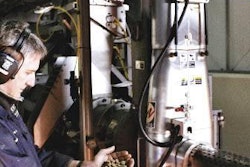The Oklahoma State University Center for Pet and Animal Food Palatability Studies in Stillwater, Oklahoma, USA provides clients with a complete range of services including experimental design, data analysis and interpretation of results. A unique aspect of this center is that it can accommodate a wide range of animals, including invertebrates, reptiles, fish, cats, dogs, llamas, horses and cattle.
In addition, the center can design traditional laboratory-based tests in which animals are trained under highly-controlled conditions to perform various responses to determine the palatability of a feed or petfood. The center uses such standard laboratory-based apparatus as operant conditioning chambers (the so-called "Skinner box") suitable for a wide variety of animals, including rodents, fish, birds, crustaceans, llamas and horses. It also has a variety of shuttle boxes (i.e., choice chambers) and Pavlovian conditioning situations suitable for many invertebrate and vertebrate species.
Services available
In return for the services of the OSU Center for Pet and Animal Food Palatability Studies, the client provides an adequate quantity of the product to be tested and funds the project. Fees are calculated in advance and are assessed for student time, materials, travel (if appropriate) and maintenance of equipment. To expand services available and improve response time, Bowser and Abramson have started their own company, PetSci, LLC (www.PetSci.com) to handle projects that don't fit within the traditional scope of the University. PetSci specializes in all types of humane testing of pet and animal products, including AAFCO feed trials.
OSU's services include:
In-home and on-farm animal taste panel evaluation of pet treats, petfood and animal feed.
Traditional laboratory-based palatability studies.
Field-based palatability studies.
Professionally-prepared reports, including video records of findings.
Evaluation of human reactions to the pet products (i.e., ease of use, packaging).
Shelf stability analysis, packaging, recommendations, business planning and marketing assistance, process design, pilot-plant facility, equipment selection and facility lay-out and design.
The Citizen Scientist program
Over the past several years, the Center for Pet and Animal Food Palatability Studies has studied a wide variety of petfood products ranging from fish bait to cat treats. When field tests are needed, the center implements a program called the citizen scientist program.
The Citizen Scientist program trains pet owners to conduct studies (e.g. preference trials and palatability tests) on their pets and livestock. The owners are trained in the skills required to conduct the study and record results. In return for participation, the pet owner receives petfood, or other rewards, and the knowledge obtained from participating in a scientific study.
The latter should not be under-estimated. Many of the characteristics of performing scientific research such as problem-solving behavior, discipline and library research are as useful to the citizens in the general population as they are to scientists. Moreover, the negative perceptions the public might have of scientists can be reduced by participating in the activities that scientists engage in.
The center recently had the opportunity to test a new health treat for dogs by using house pets instead of kenneled animals. The center wanted to directly test the product under field conditions. By working directly with pets in a natural environment, the issue of generalizing from kennel to home is eliminated. An added benefit of using pets is that the center is able to test animals with special characteristics such as blindness, obesity and those on medication. The citizen scientist program also allows the center to test a wide range of breeds.
In-home studies
The typical citizen scientist palatability study involves several steps. First, it recruits "citizen scientists" by creating a website listing. All participants are required to have an animal in good health. Each animal is seen by a veterinarian prior to the study. Participants also are required to have a video camera. Second, center staff members meet with potential participants to explain the purpose of the study.
Those who want to participate are trained to conduct the tests and record data on data sheets and video. The volunteers meet often with center staff to review the data and view training video tapes. During these meetings, changes in experimental design are discussed. Following the experiment, the volunteers are debriefed.
The center for Pet and Animal Food Palatability Studies provides expertise and economical alternatives for petfood and animal feed taste trials for both companies and the general public. The center can accommodate a wide range of animals under both laboratory and field conditions.
For additional information and to initiate your petfood or animal feed taste trial, call the Food and Agricultural Products Research and Technology Center at +1.405.744.6071, or E-mail: [email protected]; [email protected]. The website for the Food and Agricultural Products Research and Technology Center is www.fapc.okstate.edu.
















